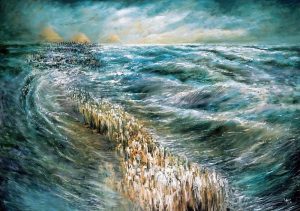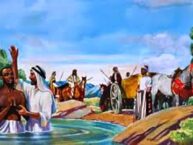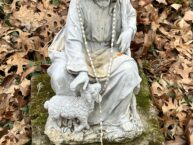
Splitting of the Red Sea. Photo: Dr. Lidia Kozenitzky/ Wiki Commons
September 6, 2020: May God’s words be spoken, may God’s words be heard. Amen.
I don’t know, but somehow hearing the story from the book of Exodus this morning seems very timely given our current situation. That passage comes just as God is about to throw the 10th and final plague against the Pharaoh and Egypt. There are, of course, deep theological issues with this whole narrative, particularly with regard to a God of love who would choose to kill innocent children and animals, which is why it helps to remember that the preceding verses about the plagues are a really a deeper mythical battle between a divine God and one of human making – God vs. an earthly ruler who thinks himself as God (we don’t know anyone like that, do we). Still, considering how 2020 has shaped up, one could be forgiven for wondering if we haven’t been somehow inserted into this story, and that tomorrow the news will report an invasion of frogs and rivers turning bloody red.
So far in 2020, there’s been a number of things “plaguing” us in this year of years (you know I had to do that, right?): a pandemic, a tanking economy, hurricanes, wildfires, violence of those in power against the citizens, locust swarms, volcano eruptions, an explosion, earthquakes, and murder hornets…have I got that right -10…now add in a comet that might hit the earth in November…and just to stay in form with the scriptures – that one will likely pass-over us. What a year it has been! I don’t know about you, but I am looking forward to New Year’s Eve like I never have before. I hope to celebrate the end of 2020, don’t you?
To be clear, this moment in Exodus wasn’t the end of the journey for the Jewish people…it was a new beginning. The meal was to be eaten in such a way as to make it clear that they were about to set out for a new life in a promised land. Yet we know that their travels through the Red Sea and across the wilderness would not be an easy one, and would take 40 years to complete. (now if only Moses had been given a GPS for Christmas, or at least stopped at the local camel filling station for directions, but whatever).
Despite the many years, and the many failings of the people along the way, as we will hear about in the coming weeks (they, like all of us, are human after all), this ritual meal instituted on this first Passover night, went with them – a formative tradition passed from generation to generation to this very day – a reminder of their own oppression, and a door through which they may remember those who are oppressed, or who are migrants on the road to freedom, as they once were. It was instituted by God in this very passage, as we heard “This day shall be a day of remembrance for you. You shall celebrate it as a festival to the Lord; throughout your generations you shall observe it as a perpetual ordinance.” This was to ensure that the faithful might not ever forget what had happened to them, and how by God’s grace, they made it to the promised land.
This is perhaps one of the most important things we do as a people of faith. For Christians, we gather together regularly, knowing that, as Jesus made clear in the gospel passage we read today, whenever two or three are gathered in his name, he will be there in the midst of them. And when we gather, we recount the stories passed down through history, like this one from Exodus, the gospels, the psalms, or the epistles, like the passage from St. Paul’s letter to the Romans heard. We hear them, and we learn about what they mean. I remember a dear friend of mine, Rob, saying to me once as we hung out at a pool one sunny summer day, “I don’t get why we have to read the bible anyway – it’s just a bunch of stories from over 2,000 years ago. Oh, how wrong he was about that!
These scriptures remind us of who we are – children of God, our Creator, who is always seeking relationship with us. We remember Christ’s death and resurrection that broke us free from the bonds of our own oppression. And we are reminded as well to turn our faces outward as we leave our gatherings, virtual or otherwise, to see the Christ in the least, the last, the lonely, and the lost.
This ritual, our Mass, the study of scripture, the recitation of our beliefs in the creeds – these are important traditions passed down from generation to generation. Doing this is part of our baptismal covenant – and a guard against those who would distort the faith to serve their own purposes, not God’s. It may not seem all that important, in light of all that is happening, but the consequences of forgetting who we are, of forgetting our shared story, can lead us away from our path, and the results can be devastating to ourselves, to our sisters and brothers in our faith community, and to those whom Jesus calls us to serve.
We all remember a few years ago hearing of the horrific separation of families at our southern border. Our own government was ripping kids out of the arms of their mothers and fathers, and putting them into cages. This abuse continues to this day. Some of the children have still not been reunited with their families, and there are some whose whereabouts are still unknown. In defending the policy, the Attorney General at that time, Jeff Sessions, quoted the bible…. a quote that came from the first verse of the very passage we read this morning, from Romans 13:1. He said at a press conference “I would cite you to the Apostle Paul and his clear and wise command in Romans 13 to obey the laws of the government because God has ordained them for the purpose of order.” Later, the White House Press Secretary at that time, Sarah Huckabee Sanders, added: “It is very biblical to enforce the law.”
This is why we remember who we are as we gather. This is why we read and study scripture. Because what these two were doing was twisted and anything but Christian. All they had to do was read the verses that followed the one they quoted, which included the words we heard today, and they would know that those who broke the law that mattered, God’s law, were the people who did this to the oppressed migrant families, because as we heard: “Owe no one anything, except to love one another; for the one who loves another has fulfilled the law. The commandments, “You shall not commit adultery; You shall not murder; You shall not steal; You shall not covet”; and any other commandment, are summed up in this word, “Love your neighbor as yourself.” Love does no wrong to a neighbor; therefore, love is the fulfilling of the law.”
“Love is the fulfilling of the law.”
Putting children in cages after kidnapping them from their parents isn’t love. Doing this because their skin is brown, and we know that is why it is done on the southern, and not our northern border, is not love. It is anything but, and it is certainly not remembering that we are called to care for the stranger in our land as a native, for that stranger is Christ himself.
It doesn’t stop there though, oh if it would. Our scriptures have also been errantly used to marginalize LGBTQ+ peoples and oppress women, just as they once were to support the sin of slavery. Usually this is done, as we saw with the passage from Romans, by pulling out a verse or two that supports what you want others to believe without any understanding (or willfully ignoring) the context, and those who don’t know any better will think that is what our sacred texts are all about – the abuse and exclusion of others.
And sadly, there is another reason that what we do here matters so much. There are also those within our own communities of faith who need a reminder of what it is we profess as followers of Jesus. I was disturbed recently to hear someone in a diocesan meeting talk about how some folks in their church might be reluctant to pledge in this Stewardship season to a, quote, “empty church.” What does that even mean? Yes, I know that most churches are not open for people like they had been, but the church “empty?” Nothing could be further from the truth.
This is why our shared story is important to remember, because not only is our tithe something we offer to God in thanksgiving for all that we have been given, rather than a gift to stones and wood, but the church is not the building – the church is us! We are the church. We are the body of Christ! The church can only be empty if we ourselves are empty! And what fills us? We are fed by scripture, by tradition, by reason, and by our experience of Jesus here, and in the world. And we feed others by sharing that to all we encounter, and passing it down from generation to generation.
For our story, our story as a people of the Jesus Movement, is that light will always defeat darkness, love is stronger than hate, and life overcomes death.
That is the gift we are given in Jesus.
That is what we must read, learn, and inwardly digest.
That is what we take in at the Eucharist – the love that conquers all, and carries us forward to break the bonds of oppression, to welcome the stranger, to give over ourselves to serve those who hunger and thirst physically, spiritually, and emotionally.
When we gather together here, virtually or otherwise, we share the story of our faith, nourish ourselves with the body and blood of Jesus in the Eucharist (even if taken spiritually), and we continue to grow in our knowledge of who we are as children of God and followers of Jesus, because folks, it is abundantly clear that we can too easily forget.
As a people moving through the desert, and Lordy, we seem to be traveling through a heck of a one now, we will be fed by the manna of God’s unconditional love and grace as we gather together, and we will have a narrative to pass down to our children and grandchildren of our journey, and our God, in this crazy time. And the story we tell, will say as much about ourselves, as it does about our God.
So the question for us all is – what will it be?
What will be our story emerging from 2020?
What will we tell newcomers to our faith about our church in this time?
Will we talk about empty pews, or about a church that is filled by the Spirit?
The story I believe this parish will tell is about a people who never lost sight of the promised land that lay before them, despite the hardships we encountered, and who came together in love, shared what they had with those in need, found strength at Christ’s table, and hope in his promise.
I believe the story we will tell will be rooted in the very scriptures we heard today:
That we were children of God on a journey through the desert.
That were are a people who came to know that salvation and a new day is near.
That we were a people who in this time of fear and anxiety laid “aside the works of darkness and put on the armor of light” to be a voice for the voiceless and to build bridges of hope in a troubled world.
That we were all these things, and still are.
That will be, our story.
And when we come to the promised land – then this desert time will also become for us one of remembrance, which we will celebrate throughout all generations in thanksgiving for the Christ who freed us, the Spirit who sustained us, and the God who offered us life.
Amen.
For the audio from the 10:30am service, click below, or subscribe to our iTunes Sermon Podcast by clicking here:
The Rev. Diana L. Wilcox
Christ Church in Bloomfield & Glen Ridge
September 6, 2020
Fourteenth Sunday After Pentecost – In A Time Of Separation
1st Reading – Exodus 12:1-14
Psalm 149
2nd Reading – Romans 13:8-14
Gospel – Matthew 18:15-20






